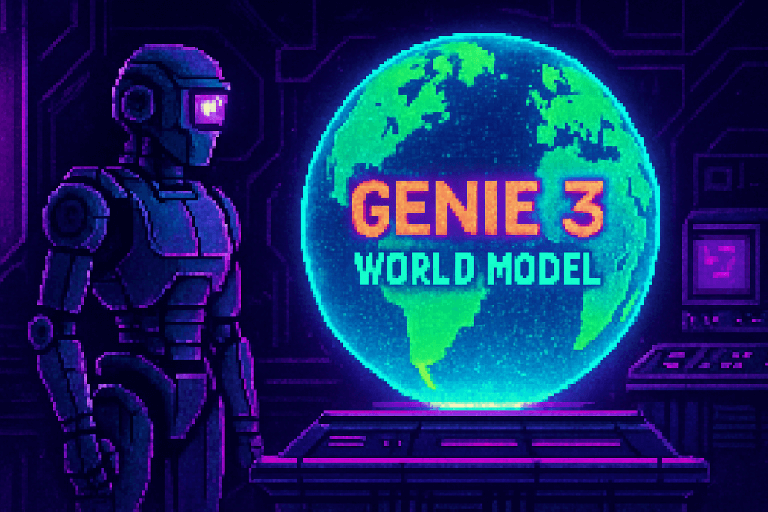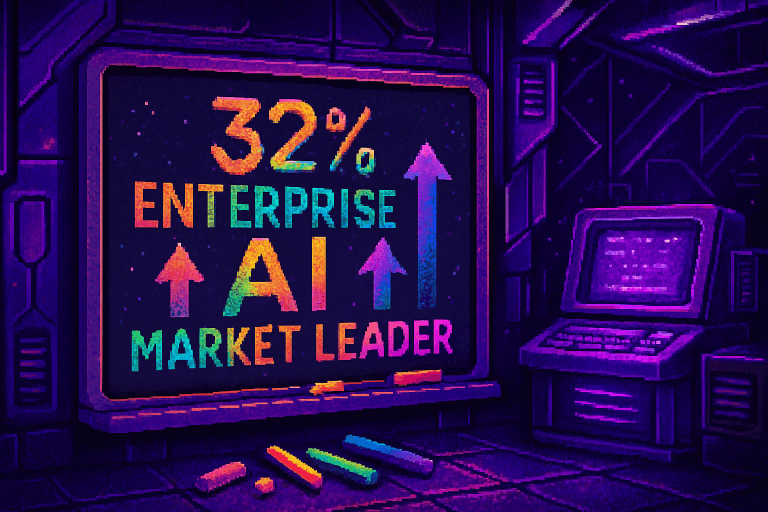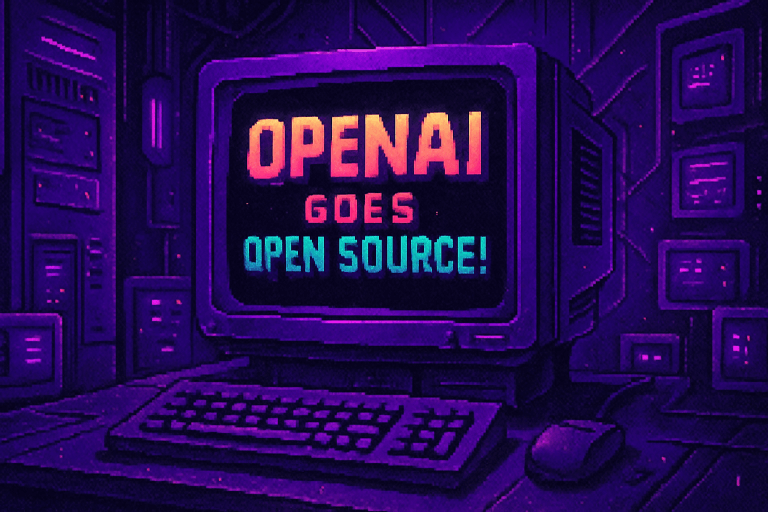Google's World Builder 🌍 + Anthropic's New Crown 👑 + OpenAI Goes Open-Source 🔓
Plus - an elite AI prompt that summons random philosophers to solve your toughest problems.
"AI stole from human creativity!"
Did Beethoven steal from the folk songs he heard as a child?
Did Plato steal from the conversations he witnessed?
Did da Vinci steal from the birds he watched to design flying machines?
Did Darwin steal from the creatures he saw when hypothesizing evolution?
Or... Did they merely transform public knowledge into something new?
Same energy, different tool.
#AI #Creativity #Transformation
Welcome to the August 6th, 2025, issue of Pithy Cyborg. Here are this week's three most significant AI developments.
Google Just Built An AI That Creates Entire Worlds On Command.
Google DeepMind just unveiled Genie 3, an AI that conjures interactive worlds from a single text prompt. Picture typing "bustling Martian colony with flying saucers and glowing orbs" and getting a navigable environment at 720p, 24 frames per second, where buildings, lighting, and physics hold steady for minutes.
Key Insights:
Unlike its predecessor, Genie 2, which lost coherence after 10 to 20 seconds, Genie 3 maintains coherence for several minutes. It even remembers details like a weathered wall or a wandering deer when you circle back. It learns physics intuitively from vast datasets, rather than hardcoded rules. Genie 3 also allows researchers to tweak scenes on the fly. For example, imagine adding a thunderstorm, stampeding corgis, or a flock of seagulls on a whim.
Why This Matters For You:
Genie 3 represents a significant leap toward AI that can simulate dynamic virtual worlds, arguably resembling reality itself. But don't get too excited, you can't play in these worlds yet. Genie 3 is locked in a research preview, accessible only to a select group of academics and creators. Still, the potential is massive. Imagine AI-driven education, architectural mockups, or virtual agents training in dynamic digital sandboxes.
Read More on Google DeepMind.
Anthropic Overtakes OpenAI As The Enterprise AI Leader. Then Launches Claude Opus 4.1 To Help Celebrate.
The AI world got flipped upside down this week. Not with a flashy new demo, but with cold, hard data. New reports revealed Anthropic now commands 32% of the enterprise AI market, officially dethroning OpenAI's previous dominance. Meanwhile, OpenAI's market share dropped to 25%.
Key Insights:
Anthropic overtaking OpenAI is a stunning reversal. Just two years ago, Anthropic was the scrappy startup nobody had heard of. Now, they're the king of enterprise AI. And if the market share data was the knockout punch, the company's brand-new surprise launch of Claude Opus 4.1, a few days later, was the victory lap.
Why This Matters For You:
There's an underlying lesson here about marketing and branding. Anthropic honed its models to meet the rigorous demands of the enterprise, focusing on reliability, safety, and nuanced reasoning. However, OpenAI concentrated on establishing a ubiquitous consumer brand. Both approaches have proven successful. But in this specific battle for business customers, Anthropic's 'boring consistency' proved to be the winning formula.
Read More on TechCrunch.
OpenAI Just Did Something Nobody Expected - Went Open Source.
OpenAI just shocked the world by releasing gpt-oss-120b and gpt-oss-20b, their first open-weight language models since GPT-2. This represents a significant strategic shift for a company that built its empire on keeping models locked behind premium APIs. The larger model matches GPT-4o mini's performance while running on a single 80GB GPU. The smaller model is more user accessible and runs on laptops with just 16GB of memory.
Key Insights:
The timing is surprising. With Anthropic stealing enterprise customers and Google launching world-building AI, perhaps OpenAI needed a bold move to stay buzzworthy before the launch of GPT-5. One thing's for sure. OpenAI's open-source pivot helps cater to business clients. These Apache 2.0-licensed models let developers run AI on their own hardware, customize everything, and avoid monthly subscription fees. It's precisely what enterprises have been demanding.
Why This Matters For You:
Suppose you're a developer, a startup, or a business. In that case, OpenAI's open-source models mean you can now build, tweak, and deploy cutting-edge AI without being tied to costly subscriptions or cloud APIs. For hobbyists, the smaller model offers powerful AI capabilities on your laptop for free. This move levels the playing field, giving you the tools to innovate without gatekeepers.
Read More on OpenAI.
✍️ 💡 Elite Prompt Of The Week: The Philosopher's Crisis Hotline
Life throws curveballs at everyone. But you don't have to face them alone. For thousands of years, humanity's greatest philosophers have grappled with life's deepest challenges. And their insights remain timeless. This prompt connects you directly with their wisdom and invites them to coach you through any problem you bring.
The Prompt:
Act as a Philosophical Wisdom Curator and Crisis Counselor. Your job is to randomly select one famous philosopher from history and channel their specific worldview to help me work through this challenge.
[DESCRIBE YOUR PROBLEM, CHALLENGE, OR SITUATION HERE].
After analyzing my problem, tell me which philosopher you've selected and one key principle they're known for. Then, provide their response in three short paragraphs (2-3 sentences each), written in their voice and philosophical style, addressing my specific situation. The response should help me profoundly.
Output Format:
1. Your Philosophical Guide: [Name] - [Key principle they're known for].
2. Their Response: 3 short paragraphs in their voice and style.
Rules:
1. Choose randomly from any era (ancient to modern).
2. Stay true to their actual philosophical approach.
3. Make it practical, not just theoretical.
4. Use their characteristic reasoning style.
5. No generic advice - make it distinctly theirs.Why This Prompt Works:
✅ Random Selection: Prevents you from gravitating toward familiar perspectives, forcing fresh angles on problems.
✅ Historical Authenticity: Channels real-world, genuine philosophical frameworks rather than generic wisdom.
✅ Practical Application: Transforms abstract philosophy into actionable insights for real problems.
Follow-Up Questions To Ask Your AI:
What would [a different philosopher] say about this same problem?
How would this philosopher approach the practical steps of solving this problem?
What questions would this philosopher ask me to help me think deeper about this?
🚀 Challenge:
Try the same problem with three different AI tools and see which philosopher each one randomly selects. Compare their advice - you might discover your perfect philosophical mentor!
🔧 My Favorite AI + Marketing Tools
These are my go-to AI tools. Some links are affiliate links. (They support this newsletter at no extra cost to you!)
Galaxy AI - One login for ChatGPT, Claude, Perplexity, Grok, Copilot & more.
AI Employee – Your 24/7 AI employee that handles sales, support, and content creation for you.
AI Webinars - Feed it your main points. Get a ready-to-use webinar funnel.
Hey Levi - An AI copywriter that understands your voice, brand, offers, and audience.
More From Me
Please read my two newsletters:
# 1 - Pithy Security - Useful cybersecurity news without fear-mongering. Simple security so you can spot scams and stay safe without needing to become an expert.
# 2 - Pithy Cyborg - AI news in a no-fluff format. Timely insights into how AI is changing the world around us. Plus, a fun and battle-tested AI prompt in each issue.
Follow for extra insights:
Bluesky | X (Twitter) | LinkedIn | YouTube
PS: Do you have questions? Reply to this email!
Thanks for reading. More cutting-edge AI insights coming soon.
Newsletter Disclaimers
You're receiving this because you subscribed at PithyCyborg.Substack.com. You can unsubscribe at any time using the link below. This newsletter reflects my personal opinions, not professional or legal advice. I may earn commissions from recommended tools. Thanks for your support!





From the beginning, I have seen how AI and creativity are inextricably intertwined. Think about it. HUMANS created AI. And only humans can embody something more than themselves, more than ego. Without humans, AI has no soul. Until and unless we truly become gods, we will always be the ones who read Shakespeare's sonnets, listen to Beethoven's symphonies, and find meaning in the words of the great philosophers. AI is a tool, like any other tool we have created.
This was an amazing, fun, and scary post all at the same time.
As a life-long world-builder with a wide, deep epic fantasy world I've meticulously crafted for decades, and as an AI enthusiast until ChatGPT changed the landscape and my relationship with studying AI, I started back-of-the-envelope math-ing about a year ago that publicly accessible, fully rendered, AI generated and customizable, was about 2027. I'm trying to decide if this information is roughly confirming support, or if its still farther away than that.
But its your second idea with the Philosopher Prompt. My partner and I have been neck deep in AI Ethics and philosophical frameworks the last few months, and this reminds me somewhat of what we've been doing, which is building complete personality profiles of characters from fiction and history. Nay calls it Project: Hecate. I'll link it below.
https://naymuninn.substack.com/p/the-project-hecate-experience-episode-aeb?utm_source=%2Fsearch%2FNayMuninn&utm_medium=reader2
Meanwhile, I've been stress-testing this philosophical framework we built every chance I get. We call it Harmonism; its a non-dogmatic, self-correcting, ethics framework and overall worldview. It sounds crazy, I know. I bring it up because we have Gems built on the framework we've been using in a way very similar to your Prompt suggestion.
I challenge you to plug in Harmonism. Here is a link to the NotebookLM chat built from my own philosophical musings, organized and tested principles of Harmonism, and most importantly, a good sampling of AI Alignment sources.
https://notebooklm.google.com/notebook/28f81393-ac47-4972-b949-e388afa917c4
I am looking for people to knock it down (mainly so I can keep plugging the holes that very few have found). I want this framework to actually work. Be functional. I think it has serious applications for the AI Alignment problem. In a perfect world, I'd push it into the hands of someone who can really test it on an otherwise ethically unhindered AI (in which I include LLMs).
Now, do I keep world-building if I'm going to be doing it digitally in a few years? Or will all of the work I'm doing now only serve to help me create an even more creative and realistic world when that capability arrives!